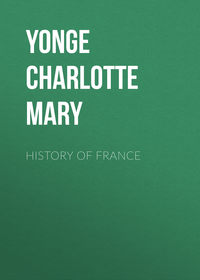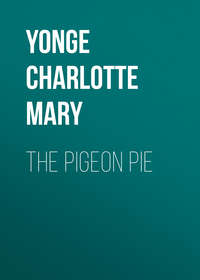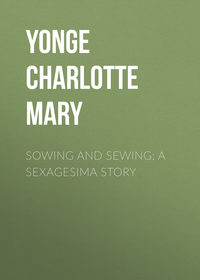
The Armourer's Prentices
“I shall have quite enough of her by and by,” returned Giles; then adding, “She is a good little wench, but it is more for her honour that her father’s servant should ride before her.”
Perronel held her tongue, and they rode merrily back to London, and astonished their several homes by the growth and healthful looks of the young people. Even Giles was grown, though he did not like to be told so, and was cherishing the down on his chin. But the most rapid development had been in Aldonza, or Alice, as Perronel insisted on calling her to suit the ears of her neighbours. The girl was just reaching the borderland of maidenhood, which came all the sooner to one of southern birth and extraction, when the great change took her from being her father’s childish darling to be Perronel’s companion and assistant. She had lain down on that fatal May Eve a child, she rose in the little house by the Temple Gardens, a maiden, and a very lovely one, with delicate, refined, beautifully cut features of a slightly aquiline cast, a bloom on her soft brunette cheek, splendid dark liquid eyes shaded by long black lashes, under brows as regular and well arched as her Eastern cousins could have made them artificially, magnificent black hair, that could hardly be contained in the close white cap, and a lithe beautiful figure on which the plainest dress sat with an Eastern grace. Perronel’s neighbours did not admire her. They were not sure whether she were most Saracen, gipsy, or Jew. In fact, she was as like Rachel at the well as her father had been to a patriarch, and her descent was of the purest Saracen lineage, but a Christian Saracen was an anomaly the London mind could not comprehend, and her presence in the family tended to cast suspicion that Master Randall himself, with his gipsy eyes, and mysterious comings and goings, must have some strange connections. For this, however, Perronel cared little. She had made her own way for many years past, and had won respect and affection by many good offices to her neighbours, one of whom had taken her laundry work in her absence.
Aldonza was by no means indocile or incapable. She shared in Perronel’s work without reluctance, making good use of her slender, dainty brown fingers, whether in cooking, household work, washing, ironing, plaiting, making or mending the stiff lawn collars and cuffs in which her hostess’s business lay. There was nothing that she would not do when asked, or when she saw that it would save trouble to good mother Perronel, of whom she was very fond, and she seemed serene and contented, never wanting to go abroad; but she was very silent, and Perronel declared herself never to have seen any living woman so perfectly satisfied to do nothing. The good dame herself was industrious, not only from thrift but from taste, and if not busy in her vocation or in household business, was either using her distaff or her needle, or chatting with her neighbours—often doing both at once; but though Aldonza could spin, sew, and embroider admirably, and would do so at the least request from her hostess, it was always a sort of task, and she never seemed so happy as when seated on the floor, with her dark eyes dreamily fixed on the narrow window, where hung her jackdaw’s cage, and the beads of her rosary passing through her fingers. At first Mistress Randall thought she was praying, but by and by came to the conviction that most of the time “the wench was bemused.” There was nothing to complain of in one so perfectly gentle and obedient, and withal, modest and devout; but the good woman, after having for some time given her the benefit of the supposition that she was grieving for her father, began to wonder at such want of activity and animation, and to think that on the whole Jack was the more talkative companion.
Aldonza had certainly not taught him the phrases he was so fond of repeating. Giles Headley had undertaken his education, and made it a reason for stealing down to the Temple many an evening after work was done, declaring that birds never learnt so well as after dark. Moreover, he had possessed himself of a chess board, and insisted that Aldonza should carry on her instructions in the game; he brought her all his Holy Cross Day gain of nuts, and he used all his blandishments to persuade Mrs. Randall to come and see the shooting at the popinjay, at Mile End.
All this made the good woman uneasy. Her husband was away, for the dread of sweating sickness had driven the Court from London, and she could only take counsel with Tibble Steelman. It was Hallowmas Eve, and Giles had been the bearer of an urgent invitation from Dennet to her friend Aldonza to come and join the diversions of the evening. There was a large number of young folk in the hall—Jasper Hope among them—mostly contemporaries of Dennet, and almost children, all keen upon the sports of the evening, namely, a sort of indoor quintain, where the revolving beam was decorated with a lighted candle at one end, and at the other an apple to be caught at by the players with their mouths, their hands being tied behind them.
Under all the uproarious merriment that each attempt occasioned, Tibble was about to steal off to his own chamber and his beloved books, when, as he backed out of the group of spectators, he was arrested by Mistress Randall, who had made her way into the rear of the party at the same time.
“Can I have a word with you, privily, Master Steelman?” she asked.
Unwillingly he muttered, “Yea, so please you;” and they retreated to a window at the dark end of the hall, where Perronel began—“The alderman’s daughter is contracted to young Giles, her kinsman, is she not?”
“Not as yet in form, but by the will of the parents,” returned Tibble, impatiently, as he thought of the half-hour’s reading which he was sacrificing to woman’s gossip.
“An it be so,” returned Perronel, “I would fain—were I Master Headley—that he spent not so many nights in gazing at mine Alice.”
“Forbid him the house, good dame.”
“Easier spoken than done,” returned Perronel. “Moreover, ’tis better to let the matter, such as it is, be open in my sight than to teach them to run after one another stealthily, whereby worse might ensue.”
“Have they spoken then to one another?” asked Tibble, beginning to take alarm.
“I trow not. I deem they know not yet what draweth them together.”
“Pish, they are mere babes!” quoth Tib, hoping he might cast it off his mind.
“Look!” said Perronel; and as they stood on the somewhat elevated floor of the bay window, they could look over the heads of the other spectators to the seats where the young girls sat.
Aldonza’s beautiful and peculiar contour of head and face rose among the round chubby English faces like a jessamine among daisies, and at that moment she was undertaking, with an exquisite smile, the care of the gown that Giles laid at her feet, ere making his venture.
“There!” said Perronel. “Mark that look on her face! I never see it save for that same youngster. The children are simple and guileless thus far, it may be. I dare be sworn that she is, but they wot not where they will be led on.”
“You are right, dame; you know best, no doubt,” said Tib, in helpless perplexity. “I wot nothing of such gear. What would you do?”
“Have the maid wedded at once, ere any harm come of it,” returned Perronel promptly. “She will make a good wife—there will be no complaining of her tongue, and she is well instructed in all good housewifery.”
“To whom then would you give her?” asked Tibble.
“Ay, that’s the question. Comely and good she is, but she is outlandish, and I fear me ’twould take a handsome portion to get her dark skin and Moorish blood o’erlooked. Nor hath she aught, poor maid, save yonder gold and pearl earrings, and a cross of gold that she says her father bade her never part with.”
“I pledged my word to her father,” said Tibble, “that I would have a care of her. I have not cared to hoard, having none to come after me, but if a matter of twenty or five-and-twenty marks would avail—”
“Wherefore not take her yourself?” said Perronel, as he stood aghast. “She is a maid of sweet obedient conditions, trained by a scholar even like yourself. She would make your chamber fair and comfortable, and tend you dutifully.”
“Whisht, good woman. ’Tis too dark to see, or you could not speak of wedlock to such as I. Think of the poor maid!”
“That is all folly! She would soon know you for a better husband than one of those young feather-pates, who have no care but of themselves.”
“Nay, mistress,” said Tibble, gravely, “your advice will not serve here. To bring that fair young wench hither, to this very court, mind you, with a mate loathly to behold as I be, and with the lad there ever before her, would be verily to give place to the devil.”
“But you are the best sword-cutler in London. You could make a living without service.”
“I am bound by too many years of faithful kindness to quit my master or my home at the Dragon,” said Tibble. “Nay, that will not serve, good friend.”
“Then what can be done?” asked Perronel, somewhat in despair. “There are the young sparks at the Temple. One or two of them are already beginning to cast eyes at her, so that I dare not let her help me carry home my basket, far less go alone. ’Tis not the wench’s fault. She shrinks from men’s eyes more than any maid I ever saw, but if she bide long with me, I wot not what may come of it. There be rufflers there who would not stick to carry her off!”
Tibble stood considering, and presently said, “Mayhap the Dean might aid thee in this matter. He is free of hand and kind of heart, and belike he would dower the maid, and find an honest man to wed her.”
Perronel thought well of the suggestion, and decided that after the mass on All Soul’s Day, and the general visiting of the graves of kindred, she would send Aldonza home with Dennet, whom they were sure to meet in the Pardon Churchyard, since her mother, as well as Abenali and Martin Fulford lay there; and herself endeavour to see Dean Colet, who was sure to be at home, as he was hardly recovered from an attack of the prevalent disorder.
Then Tibble escaped, and Perronel drew near to the party round the fire, where the divination of the burning of nuts was going on, but not successfully, since no pair hitherto put in would keep together. However, the next contribution was a snail, which had been captured on the wall, and was solemnly set to crawl on the hearth by Dennet, “to see whether it would trace a G or an H.”
However, the creature proved sullen or sleepy, and no jogging of hands, no enticing, would induce it to crawl an inch, and the alderman, taking his daughter on his knee, declared that it was a wise beast, who knew her hap was fixed. Moreover, it was time for the rere supper, for the serving-men with the lanterns would be coming for the young folk.
London entertainments for women or young people had to finish very early unless they had a strong escort to go home with, for the streets were far from safe after dark. Giles’s great desire to convoy her home, added to Perronel’s determination, and on All Souls’ Day, while knells were ringing from every church in London, she roused Aldonza from her weeping devotions at her father’s grave, and led her to Dennet, who had just finished her round of prayers at the grave of the mother she had never known, under the protection of her nurse, and two or three of the servants. The child, who had thought little of her mother, while her grandmother was alert and supplied the tenderness and care she needed, was beginning to yearn after counsel and sympathy, and to wonder, as she told her beads, what might have been, had that mother lived. She took Aldonza’s hand, and the two girls threaded their way out of the crowded churchyard together, while Perronel betook herself to the Deanery of St. Paul’s.
Good Colet was always accessible to the meanest, but he had been very ill, and the porter had some doubts about troubling him respecting the substantial young matron whose trim cap and bodice, and full petticoats, showed no tokens of distress. However, when she begged him to take in her message, that she prayed the Dean to listen to her touching the child of the old man who was slain on May Eve, he consented; and she was at once admitted to an inner chamber, where Colet, wrapped in a gown lined with lambskin, sat by the fire, looking so wan and feeble that it went to the good woman’s heart and she began by an apology for troubling him.
“Heed not that, good dame,” said the Dean, courteously, “but sit thee down and let me hear of the poor child.”
“Ah, reverend sir, would that she were still a child—” and Perronel proceeded to tell her difficulties, adding, that if the Dean could of his goodness promise one of the dowries which were yearly given to poor maidens of good character, she would inquire among her gossips for some one to marry the girl. She secretly hoped he would take the hint, and immediately portion Aldonza himself, perhaps likewise find the husband. And she was disappointed that he only promised to consider the matter and let her hear from him. She went back and told Tibble that his device was nought, an old scholar with one foot in the grave knew less of women than even he did!
However it was only four days later, that, as Mrs. Randall was hanging out her collars to dry, there came up to her from the Temple stairs a figure whom for a moment she hardly knew, so different was the long, black garb, and short gown of the lawyer’s clerk from the shabby old green suit that all her endeavours had not been able to save from many a stain of printer’s ink. It was only as he exclaimed, “Good aunt, I am fain to see thee here!” that she answered, “What, thou, Ambrose! What a fine fellow thou art! Truly I knew not thou wast of such good mien! Thou thrivest at Chelsea!”
“Who would not thrive there?” said Ambrose. “Nay, aunt, tarry a little, I have a message for thee that I would fain give before we go in to Aldonza.”
“From his reverence the Dean? Hath he bethought himself of her?”
“Ay, that hath he done,” said Ambrose. “He is not the man to halt when good may be done. What doth he do, since it seems thou hadst speech of him, but send for Sir Thomas More, then sitting at Westminster, to come and see him as soon as the Court brake up, and I attended my master. They held council together, and by and by they sent for me to ask me of what conditions and breeding the maid was, and what I knew of her father?”
“Will they wed her to thee? That were rarely good, so they gave thee some good office!” cried his aunt.
“Nay, nay,” said Ambrose. “I have much to learn and understand ere I think of a wife—if ever. Nay! But when they had heard all I could tell them, they looked at one another, and the Dean said, ‘The maid is no doubt of high blood in her own land—scarce a mate for a London butcher or currier.”
“‘It were matching an Arab mare with a costard monger’s colt,’ said my master, ‘or Angelica with Ralph Roisterdoister.’”
“I’d like to know what were better for the poor outlandish maid than to give her to some honest man,” put in Perronel.
“The end of it was,” said Ambrose, “that Sir Thomas said he was to be at the palace the next day, and he would strive to move the Queen to take her countrywoman into her service. Yea, and so he did, but though Queen Katharine was moved by hearing of a fatherless maid of Spain, and at first spake of taking her to wait on herself, yet when she heard the maid’s name, and that she was of Moorish blood, she would none of her. She said that heresy lurked in them all, and though Sir Thomas offered that the Dean or the Queen’s own chaplain should question her on the faith, it was all lost labour. I heard him tell the Dean as much, and thus it is that they bade me come for thee, and for the maid, take boat, and bring you down to Chelsea, where Sir Thomas will let her be bred up to wait on his little daughters till he can see what best may be done for her. I trow his spirit was moved by the Queen’s hardness! I heard the Dean mutter, ‘Et venient ab Oriente et Occidente.’”
Perronel hooked alarmed. “The Queen deemed her heretic in grain! Ah! She is a good wench, and of kind conditions. I would have no ill befall her, but I am glad to be rid of her. Sir Thomas—he is a wise man, ay, and a married man, with maidens of his own, and he may have more wit in the business than the rest of his kind. Be the matter instant?”
“Methinks Sir Thomas would have it so, since this being a holy day, the courts be not sitting, and he is himself at home, so that he can present the maid to his lady. And that makes no small odds.”
“Yea, but what the lady is makes the greater odds to the maid, I trow,” said Perronel anxiously.
“Fear not on that score. Dame Alice More is of kindly conditions, and will be good to any whom her lord commends to her; and as to the young ladies, never saw I any so sweet or so wise as the two elder ones, specially Mistress Margaret.”
“Well-a-day! What must be must!” philosophically observed Perronel. “Now I have my wish, I could mourn over it. I am loth to part with the wench; and my man, when he comes home, will make an outcry for his pretty Ally; but ’tis best so. Come, Alice, girl, bestir thyself. Here’s preferment for thee.”
Aldonza raised her great soft eyes in slow wonder, and when she had heard what was to befall her, declared that she wanted no advancement, and wished only to remain with mother Perronel. Nay, she clung to the kind woman, beseeching that she might not be sent away from the only motherly tenderness she had ever known, and declaring that she would work all day and all night rather than leave her; but the more reluctance she showed, the more determined was Perronel, and she could not but submit to her fate, only adding one more entreaty that she might take her jackdaw, which was now a spruce grey-headed bird. Perronel said it would be presumption in a waiting-woman, but Ambrose declared that at Chelsea there were all manner of beasts and birds, beloved by the children and by their father himself, and that he believed the daw would be welcome. At any rate, if the lady of the house objected to it, it could return with Mistress Randall.
Perronel hurried the few preparations, being afraid that Giles might take advantage of the holiday to appear on the scene, and presently Aldonza was seated in the boat, making no more lamentations after she found that her fate was inevitable, but sitting silent, with downcast head, now and then brushing away a stray tear as it stole down under her long eyelashes.
Meantime Ambrose, hoping to raise her spirits, talked to his aunt of the friendly ease and kindliness of the new home, where he was evidently as thoroughly happy as it was in his nature to be. He was much, in the position of a barrister’s clerk, superior to that of the mere servants, but inferior to the young gentlemen of larger means, though not perhaps of better birth, who had studied law regularly, and aspired to offices or to legal practice.
But though Ambrose was ranked with the three or four other clerks, his functions had more relation to Sir Thomas’s literary and diplomatic avocations than his legal ones. From Lucas Hansen he had learnt Dutch and French, and he was thus available for copying and translating foreign correspondence. His knowledge of Latin and smattering of Greek enabled him to be employed in copying into a book some of the inestimable letters of Erasmus which arrived from time to time, and Sir Thomas promoted his desire to improve himself, and had requested Mr. Clements, the tutor of the children of the house, to give him weekly lessons in Latin and Greek.
Sir Thomas had himself pointed out to him books calculated to settle his mind on the truth and catholicity of the Church, and had warned him against meddling with the fiery controversial tracts which, smuggled in often through Lucas’s means, had set his mind in commotion. And for the present at least beneath the shadow of the great man’s intelligent devotion, Ambrose’s restless spirit was tranquil.
Of course, he did not explain his state of mind to his aunt, but she gathered enough to be well content, and tried to encourage Aldonza, when at length they landed near Chelsea Church, and Ambrose led the way to an extensive pleasaunce or park, full of elms and oaks, whose yellow leaves were floating like golden rain in the sunshine.
Presently children’s voices guided them to a large chestnut tree. “Lo you now, I hear Mistress Meg’s voice, and where she is, his honour will ever be,” said Ambrose.
And sure enough, among a group of five girls and one boy, all between fourteen and nine years old, was the great lawyer, knocking down the chestnuts with a long pole, while the young ones flew about picking up the burrs from the grass, exclaiming joyously when they found a full one.
Ambrose explained that of the young ladies, one was Mistress Middleton, Lady More’s daughter by a former marriage, another a kinswoman. Perronel was for passing by unnoticed; but Ambrose knew better; and Sir Thomas, leaning on the pole, called out, “Ha, my Birkenholt, a forester born, knowst thou any mode of bringing down yonder chestnuts, which being the least within reach, seem in course the meetest of all.”
“I would I were my brother, your honour,” said Ambrose, “then would I climb the thee.”
“Thou shouldst bring him one of these days,” said Sir Thomas. “But thou hast instead brought in a fair maid. See, Meg, yonder is the poor young girl who lost her father on Ill May day. Lead her on and make her good cheer, while I speak to this good dame.”
Margaret More, a slender, dark-eyed girl of thirteen, went forward with a peculiar gentle grace to the stranger, saying, “Welcome, sweet maid! I hope we shall make thee happy,” and seeing the mournful countenance, she not only took Aldonza’s hand, but kissed her cheek.
Sir Thomas had exchanged a word or two with Perronel, when there was a cry from the younger children, who had detected the wicker cage which Perronel was trying to keep in the background.
“A daw! a daw!” was the cry. “Is’t for us?”
“Oh, mistress,” faltered Aldonza, “’tis mine—there was one who tamed it for me, and I promised ever to keep it, but if the good knight and lady forbid it, we will send it back.”
“Nay now, John, Cicely,” was Margaret saying, “’tis her own bird! Wot ye not our father will let us take nought of them that come to him? Yea, Al-don-za—is not that thy name?—I am sure my father will have thee keep it.”
She led up Aldonza, making the request for her. Sir Thomas smiled.
“Keep thy bird? Nay, that thou shalt. Look at him, Meg, is he not in fit livery for a lawyer’s house? Mark his trim legs, sable doublet and hose, and grey hood—and see, he hath the very eye of a councillor seeking for suits, as he looketh at the chestnuts John holdeth to him. I warrant he hath a tongue likewise. Canst plead for thy dinner, bird?”
“I love Giles!” uttered the black beak, to the confusion and indignation of Perronel.
The perverse bird had heard Giles often dictate this avowal, but had entirely refused to repeat it, till, stimulated by the new surroundings, it had for the first time uttered it.
“Ah! thou foolish daw! Crow that thou art! Had I known thou hadst such a word in thy beak, I’d have wrung thy neck sooner than have brought thee,” muttered Perronel. “I had best take thee home without more ado.”
It was too late, however, the children were delighted, and perfectly willing that Aldonza should own the bird, so they might hear it speak, and thus the introduction was over. Aldonza and her daw were conveyed to Dame Alice More, a stout, good-tempered woman, who had too many dependents about her house to concern herself greatly about the introduction of another.
And thus Aldonza was installed in the long, low, two-storied red house which was to be her place of home-like service.
CHAPTER XX
CLOTH OF GOLD ON THE SEAMY SIDE
“Then you lostThe view of earthly glory: men might sayTill this time pomp was single; but now marriedTo one above itself.”—Shakespeare.If Giles Headley murmured at Aldonza’s removal, it was only to Perronel, and that discreet woman kept it to herself.
In the summer of 1519 he was out of his apprenticeship, and though Dennet was only fifteen, it was not uncommon for brides to be even younger. However, the autumn of that year was signalised by a fresh outbreak of the sweating sickness, apparently a sort of influenza, and no festivities could be thought of. The King and Queen kept at a safe distance from London, and escaped, so did the inmates of the pleasant house at Chelsea; but the Cardinal, who, as Lord Chancellor, could not entirely absent himself from Westminster, was four times attacked by it, and Dean Colet, a far less robust man, had it three times, and sank at last under it. Sir Thomas More went to see his beloved old friend, and knowing Ambrose’s devotion, let the young man be his attendant. Nor could those who saw the good man ever forget his peaceful farewells, grieving only for the old mother who had lived with him in the Deanery, and in the ninetieth year of her age, thus was bereaved of the last of her twenty-one children. For himself, he was thankful to be taken away from the evil times he already beheld threatening his beloved St. Paul’s, as well as the entire Church both in England and abroad; looking back with a sad sweet smile to the happy Oxford days, when he, with More and Erasmus,









